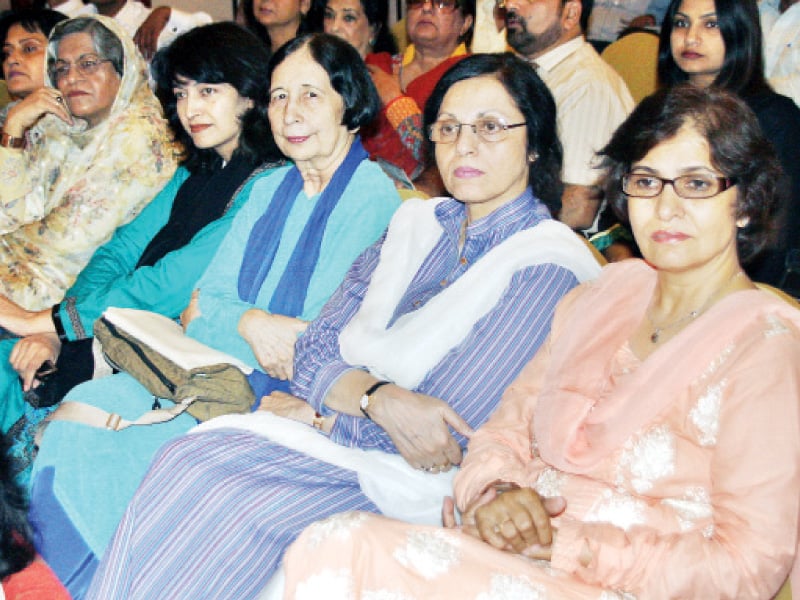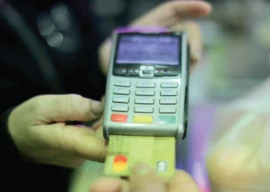
More than 700 people attended the second session of the Second International Urdu Conference organised by the Express Media Group at the Avari Hotel on Saturday.
The theme of the second session was ‘Urdu’s similarities with other languages of Pakistan’. Novelist Abdullah Hussain presided over the session, Dr Khawaja Muhammad Zakariya, Dr Anwaar Ahmed, Dr Najeeb Jamal and Dr Najiba Arif were on the panel.
The session was moderated by Aliya Shah. She said, “When I was in school, Urdu used to be one of the highest scoring subjects. Nowadays, children think Urdu is one of the toughest subjects... that is quite sad.”
Dr Arif spoke about the similarities between Urdu and Punjabi, “I’m a Punjabi but many people think I’m from an Urdu-speaking family.” She said that the beauty of Urdu was that people from various ethnicities, regions and countries could understand it.
Dr Jamal said that Urdu had roots in Arabic and Persian. It shared commonalities with almost all the languages in South Asia. He said that people who spoke Punjabi, Seraiki and Sindhi could understand Urdu very well because of their common roots. “If Urdu can’t be made the official language, we should at least take steps to save it from vanishing,” he said. “Urdu is the language of the poor,” Dr Ahmed said.
“One of the problems with Urdu is that its numbers are hard to learn,” Dr Zakariya said, “Maybe we could reach a consensus on how to solve this problem.”
He said, “We must condemn the practice of mixing languages while constructing sentences. If one cannot phrase an entire sentence in Urdu he should stick to the language he knows best.”
He also spoke against the practice of breaking down Urdu words to make them easier to read. One should only break down a sentence to make it easier to understand, he said.
Hussain, in his closing remarks, praised the speakers’ contribution.
Satirist Muhammad Amjad said, “The conference is a great initiative. It has allowed experts to get together and discuss how linguistic problems can be dealt with.”
Published in The Express Tribune, October 13th, 2013.
COMMENTS (6)
Comments are moderated and generally will be posted if they are on-topic and not abusive.
For more information, please see our Comments FAQ


1731570357-0/elon-musk-(1)1731570357-0-165x106.webp)
-(1)1717678110-0/Kendrick-(1)-(1)1717678110-0-165x106.webp)













The headline promises so much but article gives little. I clicked the link to find commonalities between Pashto and Urdu, an area that need scholarly attention. Contrary to what most people think, Pashto shares a lot of words with Hindi and Urdu (Hindustani) as it does with Persian. All these languages have a common heritage. Most Pakistanis feel Pashto is difficult but I think they just need to listen carefully. Pashto has adopted a lot of Urdu words since the birth of Pakistan partly because Urdu has received inordinately more support in education than any other regional language. I do not understand why the well-known scholars above won't promote multi-lingualism in this country rich with over 60 languages rather than just showing concern for Urdu. GoP almost exclusively works in English and Urdu when administration can be much more efficient if conducted in regional languages as well. Pakistani scholars and institutions act as if other languages do not exist. Take the Pakistan armed forces. I doubt if there is a Pashto language program for non-Pashtun soldiers even though they've been fighting a war in the Pashtun regions. I also doubt if there is a Balochi language program anywhere within the armed forces or the Pakistan government. Vital health and education advertising is not done in Pashto when it is obvious all types of vaccination promoted in a regional language will be more effective. I think this country needs to drop its high-strung attitude towards language policy to help plug the widening ethnic gap. Let's start with giving national language statuses to more languages.
Dear Abid: Two Urdu words come to my mind at this instant. "Fransisee" for Francaise and 'kartoos' for French cartouche, from Italian cartuccio, variant of cartoccio (roll of paper). I am sure more French words have found their way into Urdu through Arabic.
@Khalid Rahman: "...Apart from Arabic and Persian, Sindhi, Punjabi, Hindi, ‘Kharri Boli’ make up this language and even French and Portuguese have enriched Urdu..." . S'il vous plaît, can you enrich our knowledge by revealing those French words that have enriched Urdu. Merci Beaucoup.
It seems that the participants came with preconceived notions. Urdu, like all modern languages, has the power to absorb foreign words and Urdu words have been absorbed in other languages. Apart from Arabic and Persian, Sindhi, Punjabi, Hindi, 'Kharri Boli' make up this language and even French and Portuguese have enriched Urdu. Like Urdu has withered in India for the lack of government support and for economic reasons, so is it bound to wither in Pakistan for the same reasons. It is fortunate that in Pakistan, Urdu has found a new home in Lahore. Most of our celebrated Urdu poets and litterateurs such as Faiz, Faraz, Ahmed Nadeem Qasmi, Shafiqur Rahman, Munir Niazi, et al -- whose mother tongue was other than Urdu -- enriched Urdu.
How is that true? Urdu is the same language that is spoken in northern India and called Hindi, Urdu or Hindustani. It is a purely Indian language that is readily understood by people from UP, Lucknow and Karachi alike. After 1947, the Pakistani government began importing Persian and Arabic terms into Urdu while the Indian government began importing Sanskrit terminology into official Hindi.
But vernacular (common) Urdu and Hindi are virtually identical and a person born in India, who has never even set foot in Pakistan, will understand a Karachiite perfectly.
Lastly, Pakistan's second most spoken language, Pashto, has nothing in common with Urdu. In fact, Pashto and Balochi belong to the Eastern Iranian branch of languages whereas Urdu, Punjabi, Seraiki and Sindhi are Indo-Aryan languages. The only similarities in Pashto and Urdu are some Arabic words that are common in most near eastern languages.
For survival a language needs a geographical area, people and economic strength. The future of Urdu in South Asia including Pakistan doesn't look hopeful.
'Urdu and only Urdu shall be the National Language of Pakistan' declaration by Jinnah at Dacca (Dhaka) in 1948 destroyed his Pakistan. Now Urdu is a dead language in Bangladesh.
Future of Urdu language at its birthplace - India - doesn't look promising.
All know the socio-political economic situation of Urdu-speaking people ('Indian refugees' -- confined in few cities of Sindh) in a politically unstable Pakistan. However Urdu may survive as a Punjabi dialect in Western part of South Asia few century later.